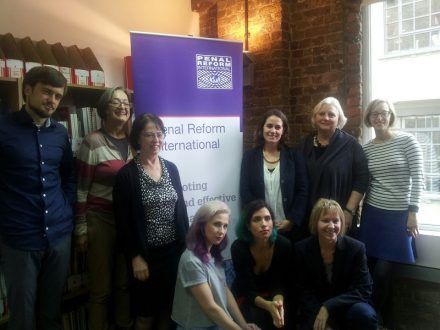When Pussy Riot met UK penal reformers
17th November 2014

PRI was pleased to welcome Pussy Riot to its offices in London on Friday along with representatives from the prison reform sector in the UK, including members of the Prison Reform Trust and Women in Prison.
Since being released after spending 18 months in the Russian penal system, Nadezhda (Nadia) Tolokonnikova and Maria (Masha) Alyokhina supported by Nadia’s husband, Piotr, and the rest of their team have become outspoken advocates for penal reform in Russia.
The punk rockers have set up two organisations: Zona Prava – which provides free legal services to convicted prisoners seeking to challenge in court their conditions and treatment, and MediaZona, a news website which covers law enforcement issues – a topic which normally gets little space in the tightly controlled Russian media.
Masha and Nadia spoke about two problems which they felt most urgently need to be addressed to improve conditions for women prisoners in Russia.
The first is poor healthcare. High levels of HIV as a result of intravenous drug use mean that many women are in very poor health. The system is severely under-resourced with a shortage of both doctors and medication. ‘If you have cancer, they give you aspirin,’ joked Piotr.
The second is prison labour, which is still very much part of life in a Russian prison, with women often working 14-16 hours a day. The majority spend their days sewing uniforms for government officials including the police and military, according to Masha. ‘The women often have to work harder than the men’, added Nadia. ‘Women are smaller in number and have fewer ways of organising or resisting’.
The conversations also revealed some perhaps surprising ways in which the Russian system has perhaps got it more right than the UK. In Russia, for example, women are permitted conjugal visits and open visits with their children. Conjugal visits are not allowed in UK prisons. They also have an email system which prisoners can use, whereas prisoners in the UK have no access to email and have to rely on the phone. Many prisoners in the UK are finding this increasingly difficult in a system where staff shortages mean that prisoners are locked up in their cells for up to 23 hours a day.
There are of course some specific reasons why these issues are particularly important in Russia. When women are imprisoned not hundreds but thousands of kilometres from their homes, their families might only be able to visit very rarely if at all. However, regular family contact with children in particular has been found to promote rehabilitation, regardless of the geography.
While many celebrities actively work to promote the protection of human rights in many different areas, there aren’t many who decide to take on penal reform and the protection of the rights of prisoners. There are also very few who can say that they were able to cite their rights under the UN Bangkok Rules on women offenders and prisoners when subjected to a strip search, as Masha did. PRI hopes that Pussy Riot will encourage more people to recognise the state of the world’s prisons as one of the most critical human rights issues.
Further information
PRI has been working in Russia since the 1998. Its current work focuses particular on torture prevention and improving independent public oversight of places of detention and protecting the rights of vulnerable groups in prisons, particularly women and children. It also runs many training programmes for prison staff raising awareness about international standards regarding the treatment of prisoners. More about our work in Russia
More about the UN Bangkok Rules on women offenders and prisoners